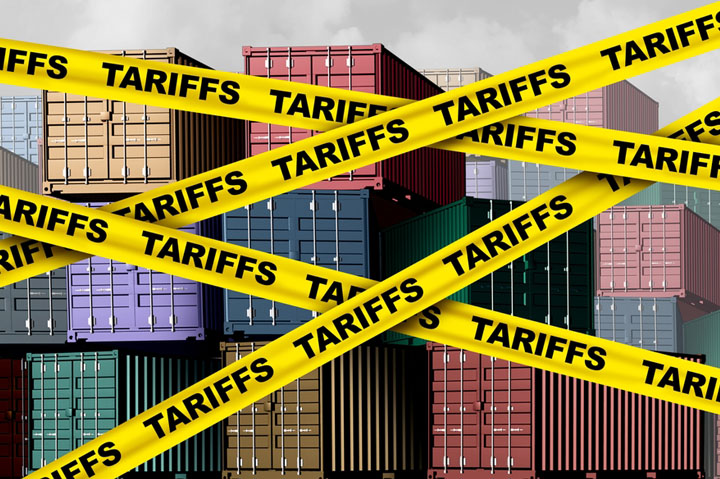News CANADIAN NEWS August 08, 2025
Canadian Promo Says It’s ‘Business as Usual’ as Tariffs Go Into Effect
The 35% blanket rate on Canadian goods is part of the Trump administration’s reciprocal levies on nearly 70 countries.
Key Takeaways
• Despite new U.S. tariffs on Canadian goods, Canadian distributors say the industry has largely adapted following earlier uncertainty.
• In response to tariffs and political rhetoric, Canadian buyers increasingly prefer domestically made products.
• While United States-Mexico-Canada Agreement exemptions protect much of Canada-U.S. trade, certain sectors – like automotive, steel and aluminum – are feeling the strain. Prime Minister Mark Carney said he wants to reduce economic dependence on the U.S. and expand global trade opportunities.
Little impact.
That’s what Lindsay Jones, owner of Rise Promotions LTD (asi/309183) in Edmonton, AB, expects after the latest round of U.S. tariffs on Canadian goods, effective Aug. 1. President Donald Trump announced the new reciprocal levies in mid-July as a penalty due to what he says is an unfettered flow of drugs over the northern border.
It’s part of the Trump administration’s slew of new tariffs on products from nearly 70 countries, most of which went into effect on Aug. 7. Trump granted a 90-day extension on trade talks to Mexico, which is facing 25% tariffs, but did not extend the same offer to Canada.

However, Canadian exports under the United States-Mexico-Canada Agreement are exempt. In recent days, Canada Prime Minister Mark Carney has said that, due to the agreement, more than 85% of cross-border trade remains tariff-free. Still, after several months of wrangling with the Trump administration, he says he’ll be exploring ways to lessen Canada’s economic reliance on the U.S.
“We cannot count or fully rely on what has been our most valued trading relationship for our prosperity,” he told reporters at a British Columbia lumber mill on Aug. 5. “That’s why we’re increasingly focused on building our strength at home and finding new opportunities for Canadian companies and workers abroad.”
The majority of Trump’s reciprocal tariffs went into effect on Aug. 7. Among the key promo sourcing countries now facing an increase are the following:
• India: 50%
• Vietnam: 20%
• Bangladesh: 20%
• Thailand: 19%
• Indonesia: 19%
• Turkey: 15%
The average levy on Chinese goods stands at 55%, pending further negotiations.
Despite key exemptions after the free trade agreement, several Canadian industries are already feeling the pinch due to a 25% tariff on select cars assembled in Canada (depending on how many American parts they contain) and a 50% tariff on steel and aluminum. Those markets are now facing increased prices, profit losses and possible layoffs. Other markets in the crosshairs, according to Trump: Canadian copper and pharmaceuticals.
“A lot of clients have requested that products don’t come in from the U.S.” Lindsay Jones, Rise Promotions LTD (asi/309183)
Meanwhile, Canadian promo products distributors and their customers have largely adjusted to the new reality. Jones, a 2024 ASI Media Distributor Salesperson Finalist, says the uncertainty earlier in the year impacted activity; now that there’s more clarity, it’s been “business as usual ever since.”
Still, in retaliation for the ongoing trade war and Trump’s “51st state” rhetoric earlier in the year, Canadians continue to demand domestically made products, including in the promo industry when they’re available. Anecdotally, Canadian distributors have said many end-buyers prefer made-in-Canada products for their campaigns. When those aren’t available or the price point is prohibitive, they ask for overseas products imported directly into Canada, and handled by Canadians. Barring that, a distant third option is products imported into Canada from a U.S. supplier.
“A lot of clients have requested that products don’t come in from the U.S.,” says Jones.
Aaron Moscoe, CEO of TPS Promotions & Incentives (asi/341409) in Markham, ON, says Canadian promo has benefited from suppliers in Canada that either carry domestically made products, import from overseas, or offer Canadian brands, like Roots73 from Counselor Top 40 supplier PCNA (asi/66887). At the moment, he continues to monitor the business impact that comes from slow or paused promo spend among those end-buyers in tariff-targeted sectors such as automotive, steel and aluminum. The recent ending of the de minimis exemption will also affect Canadians shipping smaller orders down to the U.S. Still, the promo market is largely optimistic, says Moscoe.
“We see some trepidation [among clients], but in many cases Canadian companies are doubling down on investing in their culture and their brands, which is good for our industry,” he says. “They’re pushing forward rather than waiting to see what’s going to happen tomorrow. It’s quite impressive and inspirational.”
When asked for context around recent supply chain and sourcing data from ASI Research as it pertains to Canadian promo, Scott Hulbert, managing director of distributor ideavation (asi/229801) in Richmond Hill, ON, says everyone is experiencing “tariff fatigue.” Still, while conversations among end-buyers don’t often start with tariffs anymore, Hulbert says he would like suppliers to communicate more frequently about pricing changes due to the levies to mitigate last-minute sticker shock and tough conversations with clients.
“When we have to tell customers, especially those with programs, that the unit price went up 30% a few days ago, that puts us in a tricky spot,” he says. “There’s enough knowledge about tariffs among end-buyers now; it’s more the surprise factor. Suppliers don’t communicate enough.”
Meanwhile, Trump and Carney have not yet announced plans to discuss a possible reprieve, with Carney telling reporters in British Columbia this week, “We’ll speak when it makes sense.”
Moscoe says that Canadians tend to be leery of any additional extensive trade talks, and that the USMCA/CUSMA should suffice for now. “We’re better off with that agreement in place, than we would be by entering into a bad trade agreement,” he says. “The majority of shipments from Canada to the U.S. are already covered. I don’t believe tariffs are sustainable for the long-term because they’ll lead to inflation rather than jobs moving to the U.S.”
